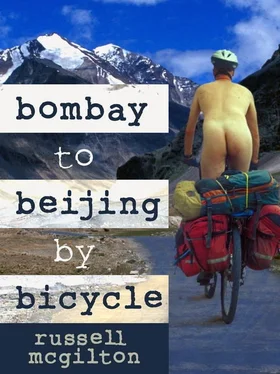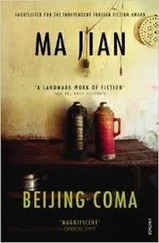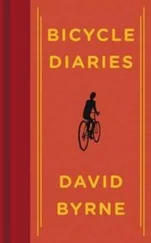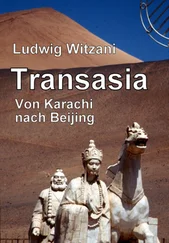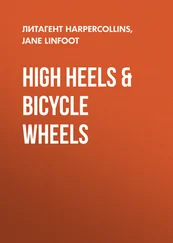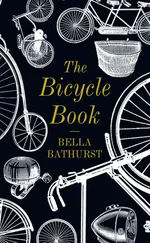I got out of bed and popped two aspirin. Soon I was asleep but the fever burned through as soon as the aspirin wore off. Every two hours I downed more. Lying there in the dark, stale room, sweating and itching, I wondered if I had malaria. And if I did, was it the dreaded cerebral malaria, the one that would travel through my blood stream, attack my brain cells, put me in a coma and then force me to wake up dead in the morning?
Perhaps that hijra in Mumbai had cursed me after all.
* * *
In the morning I went in search of a doctor and found a small clinic behind the arse of a cow that was happily chewing on the curtains. A nurse raced out and beat it with a broom until it lounged away swishing its tail shamelessly. Ah, ’dem cows!
‘Doctor?’ I asked.
I half-expected her to say, ‘No, it’s a cow,’ but thankfully she pointed me to a very serious-looking middle-aged woman with a bindi (red dot) in the middle of her forehead and a shawl draped around her as she sat at her reception–desk-cum-examination-area.
‘What do you want?’ she asked flatly.
‘I think I have malaria.’
‘Sit.’
I did.
‘Open your mouth,’ she ordered, then shone a torch down my throat.
‘You have an infected throat.’
‘Yes, it’s sore.’
‘We shall do blood sample. Go,’ she said, waving me off to a small man with a thin moustache. She went back to her paperwork as I followed him into a room where nurses were standing over a woman in a purple sari lying on a table.
‘No!’ the doctor yelled at me. ‘There is someone there.’
‘But you just said to go—’
‘Sit. You must be waiting.’
So I sat and stared at the floor. It was a small, quiet hospital and there only seemed to be me in it. When signalled to go in, I presented my arm. Three nurses took turns at tapping it until a bluish vessel reared up obediently. They popped the vein and bent the needle ridiculously, ignoring my worried face. One shouted out and an older nurse came in. She yanked hard on the syringe and filled it with my red insides, reminding me of the mosquitoes that had sucked my blood out in the first place.
I returned to the doctor’s desk and sat down.
‘Go now. Be back here at three p.m. sharp.’
When I did return, a happy, 50-something man (moustache, receding hair, round paunch) was sitting in her chair.
‘I am the husband of Dr Chawla,’ he said, shaking my hand. ‘Dr Chawla.’
‘Ah, the same.’
‘Not the same. Different,’ he frowned at me. ‘She is my wife.’
He put on his glasses and showed me the blood-test result. A Latin term was badly typed across a thin piece of paper.
‘ Plasmodium falciparum . It is a strain of malaria. There are four types: Plasmodium vivax, ovale, malariae and the one you have – falciparum – the killer malaria!’ he said, smiling. His wife’s indifference was matched only by his joy at my illness.
‘Right,’ I said, trying to digest all of this as I replayed being bitten on the ankle in the hotel in Mumbai, the bites through the night in Aurangabad, the bites on my neck in… somewhere.
‘Injection! Injection is best for you! Inside!’ In the same manner as his wife, he waved me away to a cubicle.
They laid me out on the table in the foyer of the hospital, flung a blanket over me, and popped a saline-solution drip into my surrendered forearm. The drip hung there draining itself like a bloated tick while, outside, the noxious sounds of traffic horns tore past.
I began to think of other times I had been ill in foreign lands. The worst of it had been in Egypt, in the back of a taxi on the way to the temple of Abu Simbel, hot as hell in the middle of the Aswan desert. I had stabbing pains in my stomach and had been vomiting and crapping all day. A 40-something Israeli woman had an enlightened solution.
‘Russell, to take your mind off the pain, what you need to do is to masturbate!’
At the time, I almost considered it, but I did wonder how well that would have gone down while middle-aged Americans in big shorts posed in front of the giant statues of Ramses II while I shat, vomited and jerked myself blue into a furious cloud of dust by their ankles… ‘George! What’s he doing? Do you think I should give him baksheesh to make him stop? It’s getting all over my Nikes!’
As if to muffle such thoughts, a nurse came over and put another blanket over me. I didn’t realise I had been shivering. The nurse smiled, patted my arm, then disappeared upstairs, her purple sari waving behind her. Wishing for the soft hand of Bec to palm my forehead and tell me everything was going to be alright. I had dozed off to sleep when I heard: ‘Ah, you are awake!’
It was Dr Chawla.
What does he call it when your eyes are opened?
He handed me a prescription and told me to go to the Pharmacy Market.
In Khandwa (and like most towns in India), goods and services were demarcated: textiles occupied one street – furls of blue, white, red and chequered patterns sailed on the footpaths – while metal goods – hooks, chains, cases, hardware products, nails and tools – were up the top end near the chowk (intersection). Behind the chowk and near the town square was the vegetable market, and nearby, the milk shops bubbled and frothed sweetened milk in huge woks as patrons munched on sweets, chatting, laughing and wiping away their milk moustaches.
The Pharmacy Market was in the next street, occupying most of it with small shops only big enough for one man. Packets of drugs were lined up, sitting in the sun. I’d heard some were most likely copies of the authentic product or, worse, contained not the drugs at all but turmeric. One company had apparently had so much trouble with their products being copied that they had to change their packaging three times in a year.
‘Hello. Where are you from?’ called an English accent. I snapped around to see a thin Indian man with glasses smiling from inside his tiny pharmacy. He wobbled his head and I thought instantly of a praying mantis.
His name was Sunil and his father had immigrated back to India from England, hence his clear Manchester accent. He was the oldest of his siblings and was therefore responsible for looking after his parents. His father was a doctor and Khandwa was his hometown.
‘Here is a very dusty place, very dirty,’ said Sunil from inside his shop.
‘Oh, but I find it positively cosmopolitan,’ I said. It was busier than most of the small towns I had been to in India in my brief two weeks of travel.
‘Sure, it may be a city, but you know there’s nothing to do here. People are concerned about working and making money. They don’t want to talk about other things like the rest of the world.’ He stopped and looked at me. ‘You look tired. You should get some sleep now. Come back later when you are rested. I like meeting people like you. Where are you staying?’
‘The Motil.’
‘Near the railway station? Ah, it’s not very nice there. There is a better place I know. Very clean rooms. The Rinjit Hotel. The food there is very clean.’
‘But I’ve been eating at the food stalls all through India.’
‘You shouldn’t! The food is poor quality, and then there are the flies!’
Later that night, I met Sunil at the Rinjit for dinner, the kitchen now firmly open and serving piping hot meals. As the night progressed, while we ate outside in the restaurant garden amid burning oil lanterns, Sunil’s accent glided out of his smooth English to its natural Indian staccato.
‘Eighty per cent of the people of India,’ he said, chewing on a chapatti, ‘and I’m sure you’ve seen them, are terribly poor. The common man here, if he is lucky, will have five rupees in his pocket. Not even enough to buy soap!’
Читать дальше
